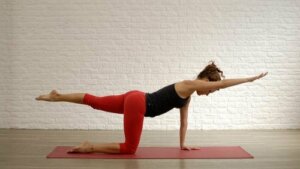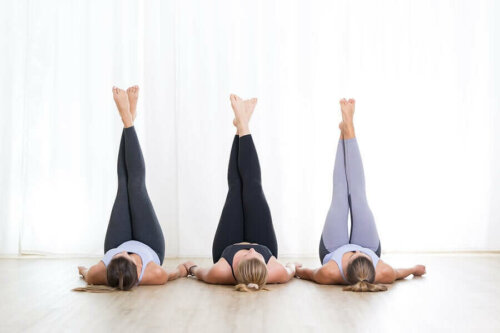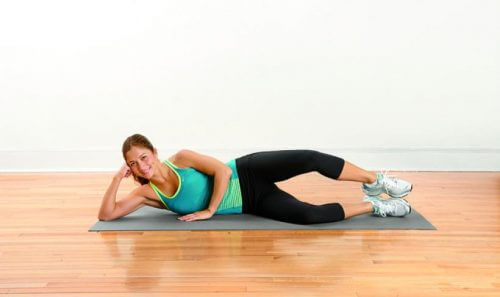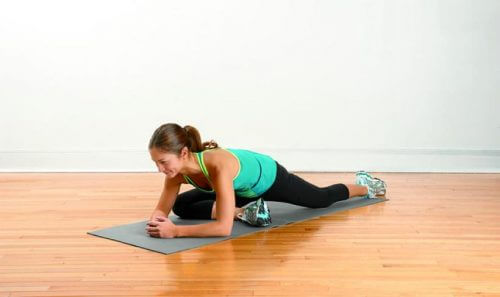Five Great Exercises to Reduce Leg Pain


Written and verified by Doctor Carlos Fabián Avila
Leg pain can be due to two primary causes:
- Fatigue generated during the day, worsened by varicose veins if you suffer from them.
- Muscular discomfort after a long, hard workout.
In the first case, the symptoms typically include heaviness, pain, itching, and in severe cases, you might experience a slight tingling sensation. Muscular leg pain is typically progressive, but may make it difficult to perform certain movements.
Pain in the legs can also be treated through massages that improve lymphatic drainage. These can also be supplemented with some stretching exercises.
Below, we share five exercises to relax your muscles that’ll help relieve leg pain. You can do it at home, at any time of the day; they’ll only take a few minutes.
What exercises should you do to reduce leg pain?
- Gentle stretching exercises
- Relaxing exercises
- Pilates
- Yoga
To relieve leg pain, you must stretch the muscles in all directions. The contraction often intensifies the pain. Thus, it’s important to make sure you treat the muscle from all angles. Many of these exercises also strengthen your muscles, so they’ll hurt less in the long run.
5 stretching exercises to reduce leg pain
If your legs hurt or feel heavy, you can try the following stretches to get relief.
1. Against the wall

This exercise will improve circulation in the legs, making it useful for all of the different causes of pain.
Thanks to the position of your legs against the wall, any blockages will be released and your pain will improve considerably.
What will you need?
- A padded mat
How do you do it?
- To perform this exercise, lie on the floor with something under your shoulders for support, and press your legs firmly against the wall.
- Your glutes should be touching the floor.
- Move your legs up and down for one minute, then rest for a minute, and repeat.
- Perform five repetitions and increase that number day by day.
2. Leg raises
What will you need?
- 1 padded mat
How do you do it?
- Lie down on the padded table.
- Balance your whole body with your right hand while lifting your right leg.
- Slowly raise your leg in a controlled manner.
- Perform this same motion 10 times, rest for one minute, and then repeat on the opposite side.
3. Butterfly
What will you need?
- 1 padded mat
How do you do it?
- Lie on the padded table. Lean over your right side and keep your knees bent.
- Support your head on your hand or your arm (whichever is more comfortable).
- Then contract the muscles of your abdomen while you raise and lower your right leg.
- Perform 20 repetitions on this side, then switch sides and repeat.
4. Hip flexor stretch

This is a complete exercise that both relaxes and stretches your muscle groups.
What will you need?
- 1 padded mat
How do you do it?
- Supporting yourself on your hands and knees, raise the heel of your right foot toward the front of your body, in front of your left hip (as in the photograph above).
- Perform 10 to 20 repetitions with a good bit of time between them. Remember that the goal of these exercises is to stretch all your muscles.
- Rest and repeat this exercise on the opposite side.
- If you prefer, you can alternate the movements with each leg.
The body rewards constancy and coherence
Remember that it’s useless to do these exercises once a month. Consistency is the key to achieving what you set out to do, such as reducing leg pain, for example.
The World Health Organization (WHO) has stated many times that daily physical exercise contributes to overall well-being. In fact, the perfect combination is a good diet and a proper exercise routine.
All cited sources were thoroughly reviewed by our team to ensure their quality, reliability, currency, and validity. The bibliography of this article was considered reliable and of academic or scientific accuracy.
- Estiramientos.es – Piernas. (n.d.). Retrieved November 28, 2018, from http://www.estiramientos.es/index.php?filt=piernas
- Beneficios del drenaje linfático. (n.d.). Retrieved November 28, 2018, from https://www.sanitas.es/sanitas/seguros/es/particulares/biblioteca-de-salud/estetica/drenaje-linfatico.html
- Guía de ejercicios recomendados para las varices. (n.d.). Retrieved November 28, 2018, from https://www.webconsultas.com/ejercicio-y-deporte/ejercicio-y-enfermedad/ejercicio-para-las-varices-3706
- Decálogo contra las varices y las piernas cansadas. (n.d.). Retrieved November 28, 2018, from https://www.efesalud.com/decalogo-contra-las-varices-y-las-piernas-cansadas/
- Varices, mala circulación y piernas cansadas. 10 Claves para su tratamiento | FisioOnline. (n.d.). Retrieved November 28, 2018, from https://www.fisioterapia-online.com/videos/varices-mala-circulacion-y-piernas-cansadas-10-claves-para-su-tratamiento
This text is provided for informational purposes only and does not replace consultation with a professional. If in doubt, consult your specialist.








